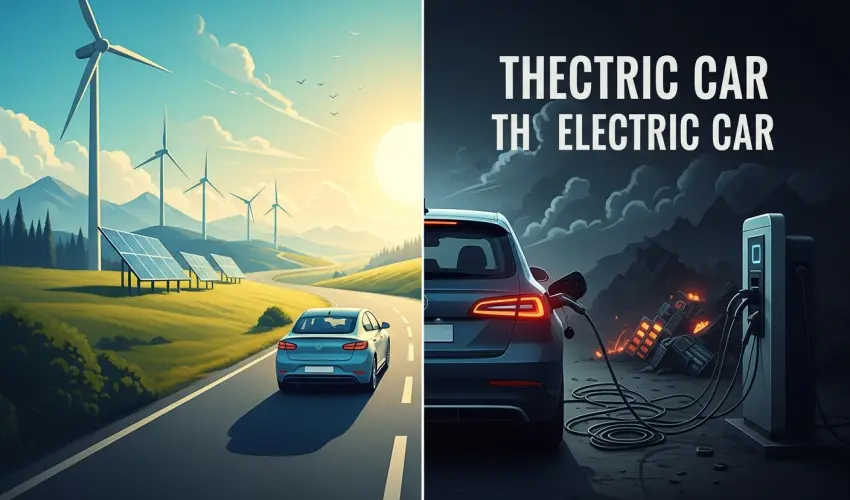Is the Electric Car Revolution a Scam? A Balanced Look at the Hype, Hope, and Hidden Costs
Published Sep 10, 2025
1 0
Key Takeaways
-
EVs offer real benefits, including reduced emissions, lower operating costs, and innovation in green tech.
-
Battery production, energy sourcing, and infrastructure gaps present serious environmental and ethical challenges.
-
The revolution is currently uneven, with wealthier and urban populations benefiting most.
-
Criticism is valid but shouldn't overshadow the potential, especially as technology and policy evolve.
-
EVs are not a scam, but they are a work in progress—part of a broader effort to build a sustainable future.
Introduction
The Rise of Electric Vehicles (EVs)
Electric vehicles have gone from fringe novelties to global game-changers in just a decade. Companies like Tesla, Rivian, BYD, and even legacy automakers like Ford and GM are racing to electrify their fleets. On the surface, it seems like a win for the planet and for progress.
Why Some People Are Skeptical
But not everyone is buying the hype. Critics argue that the EV revolution is built on shaky foundations: eco-marketing spin, government subsidies, and unsustainable supply chains. Some go as far as calling it a “green scam.”
So, is the electric car revolution a path to a cleaner future, or just another shiny marketing promise?
The Promise of the Electric Car Revolution
Zero Emissions and Cleaner Cities
EVs don’t emit tailpipe pollutants, making them ideal for reducing smog in cities. This can lead to drastically improved urban air quality and lower rates of asthma and other respiratory health problems.
Cutting-Edge Technology and Innovation
From regenerative braking to autopilot systems, EVs are packed with forward-thinking tech. They’re quieter, require fewer moving parts, and often provide faster acceleration than their gas-powered counterparts.
Reduced Dependence on Oil
Switching to electric reduces national dependence on oil, much of which is imported from unstable or environmentally destructive regions.
The Economic and Environmental Upside
Long-Term Cost Savings for Drivers
While EVs have a higher upfront cost, they’re often cheaper over time. Electricity is usually more affordable than gasoline, and EVs require less maintenance (no oil changes, fewer moving parts).
Lower Greenhouse Gas Emissions
When powered by renewable energy, EVs can have a carbon footprint that’s a fraction of a traditional car's. Even on a coal-heavy grid, they are often still cleaner over the vehicle’s full lifetime.
Boosting Green Jobs
The shift toward EVs is creating new jobs in battery tech, infrastructure, and the clean energy sector, driving the broader transition to decarbonize our economies.
The Hidden Costs and Controversies
Battery Production and Rare Earth Mining
EVs rely on lithium, cobalt, and other minerals, many of which are mined in politically unstable regions. Cobalt mining in the Democratic Republic of Congo, for example, is often linked to child labor and unsafe working conditions.
The Carbon Footprint of Manufacturing
While EVs pollute less during use, manufacturing them—especially the battery—can be far more carbon-intensive than making a gas car. This initial "carbon debt" takes time to pay off.
Dirty Electricity Sources
If your EV is charged using coal-based electricity, its environmental benefit shrinks significantly. Until our grids are truly green, EVs are only as clean as the power behind them.
The Infrastructure Challenge
Lack of Charging Stations
Urban centers are seeing more charging stations, but rural and suburban areas still lag behind. Range anxiety—the fear of running out of battery—is a real concern for many potential buyers.
Grid Capacity and Strain
Experts warn that power grids must be upgraded to handle a surge in electricity demand from millions of EVs. Without careful planning, mass adoption could strain already aging infrastructure.
Urban vs. Rural Disparities
EVs and their supporting infrastructure are far more accessible in wealthier, urban areas. This creates a gap where lower-income or rural residents can’t access the benefits.
The Role of Government and Big Business
Subsidies, Tax Breaks, and "Greenwashing"
Many EVs are only affordable thanks to government tax credits. While this helps adoption, it also means public funds are supporting private profits. Some companies also engage in greenwashing, promoting themselves as eco-friendly while continuing harmful practices.
Are Automakers Really Going Green?
Auto giants have all made bold EV commitments, but many are also lobbying against stricter fuel efficiency standards. Critics argue their motives are more about market share than saving the planet.
The Consumer Experience
High Upfront Costs
While long-term costs are lower, many EVs remain out of reach for the average consumer. Affordability is a major hurdle.
Range Anxiety and Real-World Limitations
Range is often reduced by harsh weather, heavy loads, or high speeds, making real-world performance different from advertised figures.
Who Really Benefits?
The early adopters of EVs are often affluent. Lower-income drivers may be priced out or lack access to at-home charging, raising concerns that EV benefits are not being distributed equally.
Is It a Scam or a Growing Pain?
Every Revolution Has Trade-Offs
The EV movement is far from perfect. But that doesn’t mean it’s a scam. It’s a transition, and like all big changes, it’s messy.
Comparing EVs to Gas Cars in the Bigger Picture
Despite their flaws, EVs are generally cleaner, cheaper to run, and more sustainable long-term than internal combustion engines. No vehicle is “perfectly green,” but EVs offer a better path forward.
Are Critics Missing the Long-Term Vision?
Critics often focus on current issues without considering the future. As battery technology improves, renewable energy expands, and infrastructure grows, many of today’s limitations may fade.
Conclusion: The Truth Behind the Hype
So, is the electric car revolution a scam? No. But it’s also not a silver bullet. It’s a necessary, flawed, and evolving movement toward cleaner transportation. The hype is real, but so are the challenges.
Dismissing the entire movement ignores the real progress being made. The electric car revolution is far from perfect, but it’s still a revolution worth driving forward.








